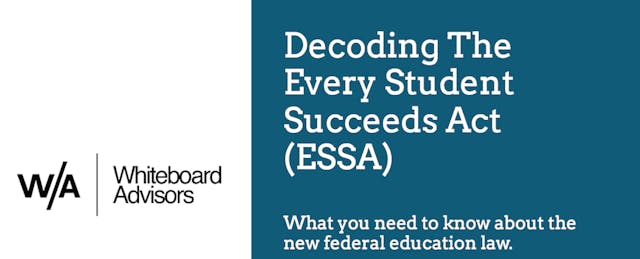The Every Student Succeeds Act is one of the most significant pieces of education legislation created in the past decade. Have you read it?
If not, no worries. We hosted a webinar, “Decoding the Every Student Succeeds Act,” with Whiteboard Advisors on February 17 to decipher the fine print of the 1,000-page government bill.
Our panelists included Whiteboard Advisors’ Head of Research David DeSchryver, former North Carolina Governor Bev Perdue, Carissa Moffat Miller of the Council of Chief State School Officers and former White House Education Advisor Andy Rotherham. I moderated the conversation.
ESSA, a sweeping revision of No Child Left Behind, will shift who governs education. The act transitions power over education away from the federal government to state legislations. In many ways, it’s a result of pushback against Arne Duncan’s assessment-heavy agenda and against the terms of the Common Core.
But how is all that change taking place? Where the appropriated funding dollars will go is still in flux as Congress parses out the bill. Educators, administrators and entrepreneurs will see the landscape of their professions shift in the next year as more details emerge.
DeSchryver presented the specifics of the possible changes emerging from ESSA, and his slides formed the backbone of the webinar as panelists shot back and forth.
Participants opened with comments on how assessments and accountability will change. With states holding more power, educators can expect more customized tests and different schedules. Some states will opt for yearly exams; others will keep a timetable more in line with the Common Core.
Several panelists expressed hope for the opportunities for innovation throughout the act. There are new definitions and emphases on education technologies. Governor Perdue was optimistic about the potential for testing technologies and their promising initial results in her state.
How states collect data will come under scrutiny as well, and DeSchryver said this will be an area of special importance as state governments attempt to measure and ameliorate the struggles of their Title I schools. An example: ESSA still focuses on the poorest performing schools and consistently underperforming subgroups in Title I schools, but how states measure those schools and fund interventions will change.
You can view and download the presentation on Whiteboard Advisors’ website. You can see what other people had to say about the webinar on Twitter in the #ESSAchat, and you can watch the full recording below:


